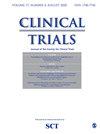Accrual Quality Improvement Program for clinical trials
IF 2.2
3区 医学
Q3 MEDICINE, RESEARCH & EXPERIMENTAL
引用次数: 0
Abstract
BackgroundThe Early Phase Cancer Prevention Clinical Trials Program (Consortia), led by the Division of Cancer Prevention, National Cancer Institute, supports and conducts trials assessing safety, tolerability, and cancer preventive potential of a variety of interventions. Accrual to cancer prevention trials includes the recruitment of unaffected populations, posing unique challenges related to minimizing participant burden and risk, given the less evident or measurable benefits to individual participants. The Accrual Quality Improvement Program was developed to address these challenges and better understand the multiple determinants of accrual activity throughout the life of the trial. Through continuous monitoring of accrual data, Accrual Quality Improvement Program identifies positive and negative factors in real-time to optimize enrollment rates for ongoing and future trials.MethodsThe Accrual Quality Improvement Program provides a web-based centralized infrastructure for collecting, analyzing, visualizing, and storing qualitative and quantitative participant-, site-, and study-level data. The Accrual Quality Improvement Program approaches cancer prevention clinical trial accrual as multi-factorial, recognizing protocol design, potential participants’ characteristics, and individual site as well as study-wide implementation issues.ResultsThe Accrual Quality Improvement Program was used across 39 Consortia trials from 2014 to 2022 to collect comprehensive trial information. The Accrual Quality Improvement Program captures data at the participant level, including number of charts reviewed, potential participants contacted and reasons why participants were not eligible for contact or did not consent to the trial or start intervention. The Accrual Quality Improvement Program also captures site-level (e.g. staffing issues) and study-level (e.g. when protocol amendments are made) data at each step of the recruitment/enrollment process, from potential participant identification to contact, consent, intervention, and study completion using a Recruitment Journal. Accrual Quality Improvement Program’s functionality also includes tracking and visualization of a trial’s cumulative accrual rate compared to the projected accrual rate, including a zone-based performance rating with corresponding quality improvement intervention recommendations.ConclusionThe challenges associated with recruitment and timely completion of early phase cancer prevention clinical trials necessitate a data collection program capable of continuous collection and quality improvement. The Accrual Quality Improvement Program collects cumulative data across National Cancer Institute, Division of Cancer Prevention early phase clinical trials, providing the opportunity for real-time review of participant-, site-, and study-level data and thereby enables responsive recruitment strategy and protocol modifications for improved recruitment rates to ongoing trials. Of note, Accrual Quality Improvement Program data collected from ongoing trials will inform future trials to optimize protocol design and maximize accrual efficiency.临床试验累积质量改进计划
背景由美国国立癌症研究所癌症预防部领导的早期癌症预防临床试验计划(Cancer Prevention Clinical Trials Program,简称 Consortia)支持并开展了多项试验,以评估各种干预措施的安全性、耐受性和癌症预防潜力。癌症预防试验的招募工作包括招募未受影响的人群,这给最大限度地减轻参与者的负担和风险带来了独特的挑战,因为这对参与者个人的益处并不明显或无法衡量。制定应计质量改进计划就是为了应对这些挑战,并更好地了解整个试验期间应计活动的多种决定因素。通过对应计数据的持续监控,应计质量改进计划可实时识别积极和消极因素,以优化正在进行和未来试验的入组率。方法应计质量改进计划提供了一个基于网络的集中式基础设施,用于收集、分析、可视化和存储定性和定量的参与者、研究机构和研究水平数据。应计质量改进计划将癌症预防临床试验的应计视为多因素影响,同时考虑到方案设计、潜在参与者的特征、个别研究机构以及整个研究的实施问题。结果 2014年至2022年,应计质量改进计划被用于39项联合体试验,以收集全面的试验信息。招募质量改进计划收集参与者层面的数据,包括审查的病历数量、联系的潜在参与者以及参与者不符合联系条件或不同意参加试验或开始干预的原因。招募质量改进计划还使用 "招募日志 "捕捉招募/注册过程中从潜在参与者识别到联系、同意、干预和研究完成等每一步的研究机构层面(如人员配置问题)和研究层面(如修改方案时)的数据。Accrual 质量改进计划的功能还包括跟踪和可视化试验的累计应计率与预计应计率的比较,包括基于区域的绩效评级和相应的质量改进干预建议。招募质量改进计划收集了美国国立癌症研究所癌症预防部早期临床试验的累积数据,提供了对参与者、研究地点和研究水平数据进行实时审查的机会,从而能够对招募策略和方案进行响应性修改,以提高正在进行的试验的招募率。值得注意的是,从正在进行的试验中收集的 "应计质量改进计划 "数据将为未来的试验提供信息,以优化方案设计,最大限度地提高应计效率。
本文章由计算机程序翻译,如有差异,请以英文原文为准。
求助全文
约1分钟内获得全文
求助全文
来源期刊

Clinical Trials
医学-医学:研究与实验
CiteScore
4.10
自引率
3.70%
发文量
82
审稿时长
6-12 weeks
期刊介绍:
Clinical Trials is dedicated to advancing knowledge on the design and conduct of clinical trials related research methodologies. Covering the design, conduct, analysis, synthesis and evaluation of key methodologies, the journal remains on the cusp of the latest topics, including ethics, regulation and policy impact.
 求助内容:
求助内容: 应助结果提醒方式:
应助结果提醒方式:


